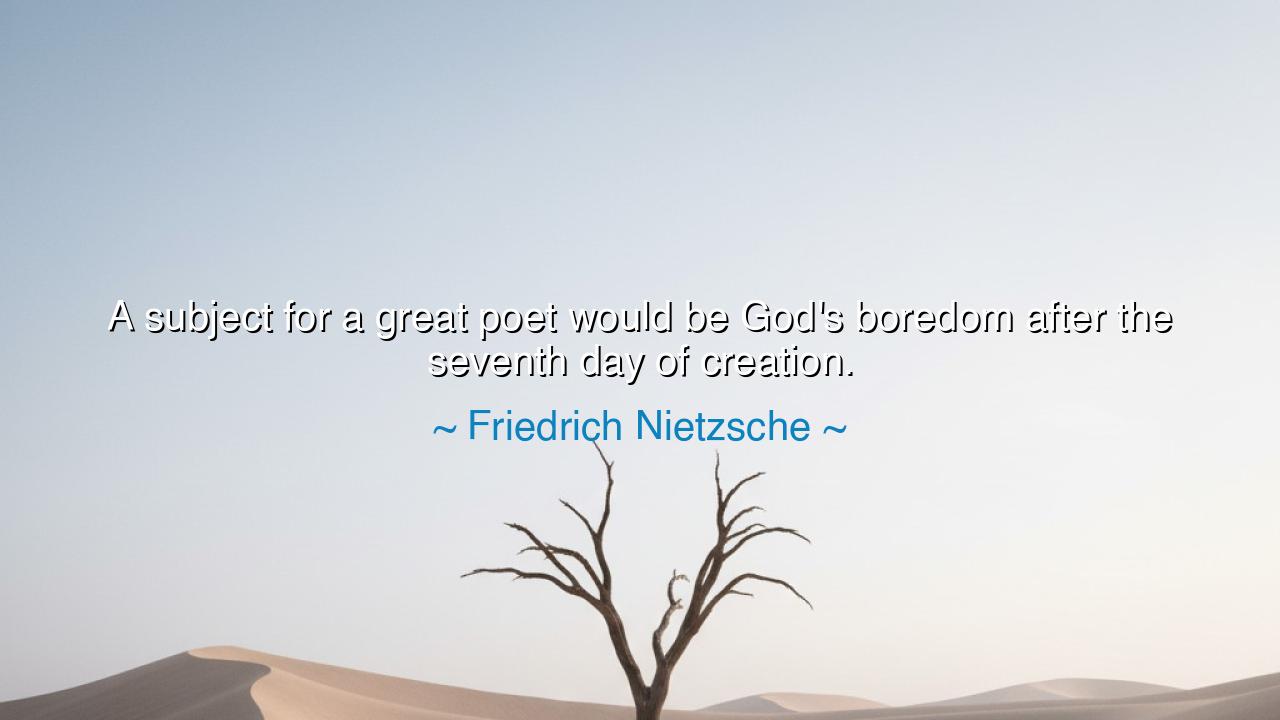
A subject for a great poet would be God's boredom after the






"A subject for a great poet would be God's boredom after the seventh day of creation." – Friedrich Nietzsche
Thus spoke Friedrich Nietzsche, the philosopher of fire and solitude, the herald of a new dawn of thought. When he said, “A subject for a great poet would be God’s boredom after the seventh day of creation,” he uttered not blasphemy, but revelation. He was not mocking the divine, but probing the restless spirit of creation itself. For in his words lies a question that burns through the heart of existence: what happens after perfection is achieved? What becomes of the creator — divine or human — when his work is complete, his purpose fulfilled, his hands idle?
The origin of this quote emerges from Nietzsche’s reflections on creation, will, and purpose, found within his writings on art and metaphysics. In the Genesis story, God labors for six days to shape the world — light and darkness, sea and land, beast and man — and on the seventh day, He rests. But Nietzsche, the philosopher who sought to reawaken human creativity in an age of conformity, imagines what followed that divine rest. He sees in that moment a cosmic silence, a stillness not of peace but of boredom — for the act of creation is life’s truest joy, and when it ceases, even the gods might yearn again for struggle, for motion, for something yet undone.
Through this strange and daring vision, Nietzsche reveals his deepest conviction: that to create is to live, and to cease creating is to begin to die. He understood that boredom — that quiet, empty ache — is not merely a human emotion but the shadow of existence itself, when purpose fades. For both gods and men, meaning is born not from rest, but from the striving toward the infinite. If creation ends, life becomes still; if perfection is reached, there is nothing left to chase. Thus, Nietzsche’s imagined “boredom of God” is not mockery but metaphor — the eternal reminder that joy dwells not in the finished world, but in the act of creating it.
Consider, then, the artists and visionaries of history who, like gods in miniature, faced this divine boredom. Leonardo da Vinci, after painting the Mona Lisa and designing marvels for which his age was not ready, fell into long stretches of restless silence, unable to find satisfaction in perfection. Beethoven, after completing his great symphonies, struggled against deafness and despair, still yearning to compose a music that could speak the language of the divine. Even Alexander the Great, after conquering the known world, wept because there were no more worlds to conquer. These were not failures of ambition, but of completion — for once the summit is reached, there remains only the void beyond it.
Nietzsche’s insight, then, is both warning and wisdom. It tells us that life’s meaning lies in movement, not in stillness; in becoming, not in being. Creation, whether of art, knowledge, or character, must never end, for when it does, the soul begins to wither. The myth of the seventh day becomes for him a parable — that even the divine must invent new purposes, new challenges, lest the fire of existence grow cold. The boredom of God becomes the mirror of the human condition: when we believe we have achieved all, we lose the will to create more.
In this, Nietzsche speaks to every generation that grows weary amid comfort and stability. He warns that when society grows content, when it no longer dreams, it begins to decay. The poet, he says, should not glorify God’s rest but His restlessness — that divine yearning which drives both heaven and earth toward renewal. For the sacred duty of humankind is not to bask in the finished world, but to continue creation, to shape meaning, to build, to destroy, to rebuild again. That is the eternal rhythm of life: creation, exhaustion, rebirth.
So, my child of the eternal struggle, learn from this vision of divine boredom. Do not seek peace in idleness or perfection in completion. Let your spirit remain unfinished, ever hungry, ever seeking new forms of beauty and truth. When you achieve, begin again; when you rest, dream anew. For to live is to create, and to create is to share in the divine fire that once stirred the cosmos from darkness. As Nietzsche teaches, the poet’s task — and the human destiny — is not to admire what is, but to awaken what might yet be. For even the gods, in their boredom, await those brave enough to begin the next creation.






AAdministratorAdministrator
Welcome, honored guests. Please leave a comment, we will respond soon